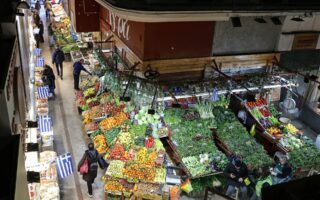As I battle the traffic on Vassilissis Sofias Avenue to make my appointment with Floris Costalas at her home near the landmark Athens Hilton Hotel, I ponder what makes the perfect hostess. Is it a gene or an excess of soul that finds an outlet in the exacting task of hospitality? Or is it an innate talent for staging the small details of life? And what is the driving force? Giving and receiving joy?
Those of us who love having people over, designing the menu, cooking, setting the table, picking the music, the wine and the flowers, know the incredible amount of effort and time it takes. But we also know the sweet satisfaction at the end, the feeling of accomplishment as we give and receive thanks.
And I think of my own hostess who is waiting for me. I imagine her fluffing cushions and seeing to our meal. We agreed on fish – she was considerate enough to ask. “A hostess must always know what her guests enjoy. Whether they like grouper or salmon, whether they eat cauliflower, what they love and hate, whether they have any allergies. Your guests appreciate this and everyone is happy at the end,” she says.
Floris Costalas is a successful Greek-American businesswoman who turned the art of hospitality, a skill she learned at an early age, into a career. She is also a mother and a grandmother. The apartment is chic and bright, as is she. It is luxurious with the kind of opulence that stems from good taste, a home where you witness a journey, a full and charmed life.
She comes from the US often, staying in Athens or in her ancestral village Karyes in Laconia, in the southeastern Peloponnese. “Do you know the village? It’s in the foothills of Mount Parnonas. The Caryatids are named after the ancient settlement that once stood there,” she says, getting up to bring more wine, walking deliberately, like Gloria Swanson in “Sunset Boulevard,” as she checks the tangible environment, a setting of classic handmade furniture, modernist pieces, floral arrangements, crystal sculptures by Lalique and a dining room table festooned with macaroons, pink donuts, two old-fashioned cakes and small plates with letters spelling out her and her granddaughter’s name.
“Parnonas has all sorts of treasures: mountain tea, oregano, thyme, chestnuts, walnuts and olives. I remember the adults going off to hunt when I was a child and I still have my grandfather’s recipe for a stew with 13 ingredients. I remember the women making hylopites in the summer and trahana in huge cauldrons. When you’ve lived abroad especially, you appreciate the treasures of this country. We forget it sometimes, but this is our heritage,” she says.
The family moved to Athens when Costalas was 12 years old and settled in Patissia, then one of the city’s loveliest neighborhoods. “We put on wonderful Sunday lunches, continuing the custom of having uncles, aunts and friends over. My mother had a particular talent for hosting; she taught me how to look after people. I have such powerful memories of those gatherings.”
I follow her into the kitchen where she’s gently warming the soup and getting ready to plate the salmon. We head out onto the balcony. Oh, that view! The Hilton being revamped, Lycabettus Hill, the National Gallery, Vassileos Alexandrou Avenue stemming off Vassilissis Sofias, Evangelismos Park, the interwar building designed by Kostas Kitsikis with its oriel windows on the corner of Gennadiou, the glass sculpture of “The Runner” – a tableaux of new compositions on an ancient backdrop. It’s so profoundly urbane, I wonder how the landscape we are in influences our personal style, our homes and the way we entertain.
Floris Costalas left Greece for New York in the 1970s as a young bride at the age of 19. She soon had two children, a boy and a girl, and her husband was in the restaurant business on Wall Street. They moved from that area closer to Central Park when the children started school, living in the same building as Mikhail Baryshnikov and Alexander Godunov. She spent 25 years in that legendary apartment building.
“When people learned that I was Greek, they expressed an interest in our food, so I started having dinner parties for the neighbors, making things like roasted lamb and mageiritsa stew. I loved it. And we threw these amazing dinners at Christmas and New Year’s. I remember being in the kitchen most of the time. I even hosted the Greek national basketball team.”
Like other ladies in her social circle, she began helping the Greek Orthodox Archdiocese of America in its charitable activities. “Philoptochos is the second biggest philanthropic organization in America, after the Jewish Hadassah,” she notes.
But she also wanted to work, to do something of her own. “A friend, an executive at Estee Lauder in the General Motors Building, suggested that I prepare some lunches, sandwiches and salads. I worked with them for 12 years. It was a great job. We even served at the Lauder house. That’s how it all started,” she says.
Her small company grew into a major events organizing firm and soon became the toast of the town. “New York Magazine described us as one of the city’s most up-and-coming firms. I started working with some of the best chefs and had my finger on the pulse of everything that was happening in the city. Michael Douglas and Barbara Walters were among our many celebrity clients, along with prominent Greeks from the circle of shipowners and others,” she says.
We sit at the table. The menu she has designed is beautifully balanced and wisely arranged. It’s a little bit European, a bit American and a bit Greek – a mirror of her own life. We talk about the art of hosting, how a party is a story and a menu a narrative. “Every party is a story, but few remain etched in memory, really touch us. You may have gone to 50 dinner parties, but there will be two or three that you will always remember, that you really felt a part of. And that is what the host must see to.”
I ask her to relate some of the crazier moments of her career. Some of the stories just cannot be printed, but she does not disappoint: “It was the enthronement of the new archbishop of America and we were suddenly short of 80 chairs, which needed to be gold in color. I couldn’t find them anywhere, so I called up one of my suppliers and told him to find 80 identical chairs and to paint them gold. ‘But they have to be dry by Sunday,’ I told him. So that Sunday, the priests sat down in the chairs and when they stood up, their robes were painted gold!” she reminisces.
“That’s the kind of thing that happens in this business. That’s why I didn’t want to get involved with food. A lot of people think that what they’re doing is catering, but they have no idea how serious and special it is. Only a few people really know the job. I wanted to look after people’s special moments, their weddings, baptisms and special events.”
In the late 1990s, she opened Floris Special Events in Thessaloniki, northern Greece. “I think we opened the market in Greece. Such weddings and baptisms didn’t take place before us. We were pioneers. We took on major jobs, original events, working with celebrity chefs. We worked at the Ecali Club and Pentelikon, on Patmos, Santorini and Mykonos before they became what they are today.”
The business is now run by her daughter Vivian and she is enjoying the “best role” of her life, that of grandmother. “I love cooking for my Floris and looking after my family.”
The secrets of hospitality
Before we go, Floris Costalas shares some of the top tips of successful hosting.
“How you receive people and see to them is very important, so you have to do it with pleasure, you have to love it; otherwise it doesn’t work. Another secret, a magical one, is the composition of your guests, who you invite and how you seat them. Place cards help, with a small note for each guest. As for the food, we can repeat successful menus and recipes, after asking our guests about their likes and dislikes. And the biggest secret of all has to do with the first and last thing they taste: The first course and the dessert are what really sticks with us, and they make a bigger impact when they are delicious!”
This article originally appeared in Gastronomos, Kathimerini’s monthly food magazine.






